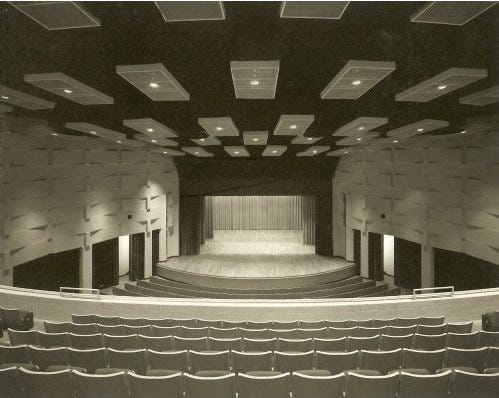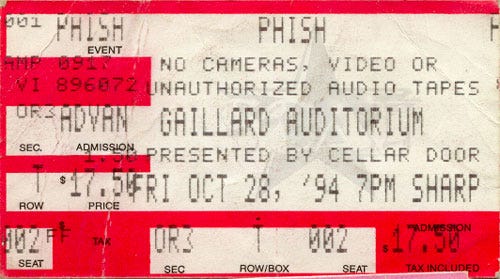
The biggest change to the architecture of a Phish show in Fall 1994 is the addition of the bluegrass mini-set. For all but five of the 18 shows so far, the band has switched to acoustic instruments late in the second set or in the encore and played at least one song. Most often, it’s their rearrangement of “the old bluegrass tune” Foreplay/Long Time, a joke that’s yet to grow old for the band and which the audience absolutely eats up every time. But some additional covers have started rotating in, including future mainstays The Old Home Place, Nellie Kane, and Ginseng Sullivan, as well as the briefly-played Beaumont Rag.
Even if it doesn’t change much from night to night, I’ve got no beef with the bluegrass setup. Sure, it kind of brings second sets to a screeching halt when it appears there, but in that Cooler role, it’s a breath of fresh air after hearing a hundred-some Big Ball Jam/Fish Song segments. Learning and practicing the collaborative approach of bluegrass and trying their hand at some unfamiliar instruments was likely a beneficial influence on the band in this key era, which will only accelerate when the Rev. Jeff Mosier shows up next month.
What I really want to talk about for this show is how the bluegrass set has inflamed that most bitter of Phish fan civil wars this fall: the epic, ceaseless struggle between the clappers and the shushers. For much of 93 and 94, these conflicts occurred during the almost-nightly a capella selection, and got particularly nasty whenever the band decided to sing without amplification. But those a capella segments were brief, typically only a couple minutes, and sequestered at the end of a set or the start of the encore. The bluegrass set, which can occasionally run to three or four songs in length, has raised the stakes.
Tonight in Charleston, across the harbor from Fort Sumter, is a particularly bloody clash. A pretty fiery set with a fully Manteca-ed Bowie and a ripping Chalk Dust settles in for a trio of bluegrass songs at the end, played traditional single mic style (Paul, we learned a few shows ago, has bought a new microphone for this purpose). We’re in the Carolinas, pretty solid bluegrass country, so a healthy contingent of the crowd does what comes natural when one hears bluegrass music — they clap along, and occasionally holler. But hot on their heels comes the other party, insisting upon what they view as the proper respectful silence through the ancient language of “shhhhhh.” For the rest of the set, brief outbreaks of clapping and the occasional “woo!” are cut off by the shushers, with no apparent victory won by either side.
I’m honestly not sure where my sympathies lie in this dispute. On one hand, these sets are typically pretty hard to hear on the tape, even when mic-ed up, so keeping the extraneous crowd noise down is welcome. On the other hand, from a purely aesthetic perspective, the shushing sound is way more unpleasant on headphones than rhythmic clapping or even the occasional wook-whoop, and bluegrass is a genre that pretty blatantly encourages crowd participation, not arms-crossed reflection.

Equally cloudy is which side the band would have been on in 1994. For one thing, it’s a pretty cheeky move to play quiet, traditional music late in a rock show to a majority chemically-enhanced college-age audience. There’s perhaps an undercurrent of encouraging close listening in their fans with these songs and this setup, a practice that will pay off not just for the acoustic set, but for increasingly intricate electric explorations as well. But then again, one of those “old bluegrass tunes” they’re playing is a Boston cover — not exactly holy music that is meant for sober, silent contemplation.
The bluegrass set would fade away, but these kinds of crowd controversies endure to this day. Yesterday’s clappers vs. shushers is today’s argument over whether you should “woo” during a start-stop jam, the kind of fan argument that makes you wonder what you’re doing with your life (for the record, I don’t woo myself, but don’t judge those who choose to woo, except during Vultures). In a way, the persistence of these kinds of disputes is a symptom of the central tension of Phish: are they a party band, or are they serious music that rewards rapt attention? The unsatisfying answer is that they’re both, the clappers and shushers are both right, and both wrong, and the war will never end.
[Stub from Golgi Project.]


